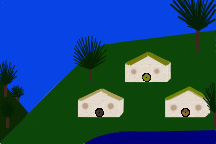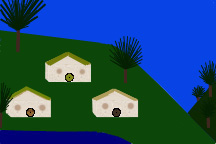 |
|
 |
 |
|
 |
Concerning Hobbits | Calendars & Chronologies | Shire Library | Shire Geography | Mathom House (Misc) | Home
The City of Present Sorrow
(from "The History of Eriol or Aelfwine" chapter in The Book of Lost Tales 2)
There is a city that far distant lies
And a vale outcarven in forgotten days -
There wider was the grass, and lofty elms more rare;
The river-sense was heavy in the lowland air.
There many willows changed the aspect of the earth and skies
Where feeding brooks wound in by sluggish ways,
And down the margin of the sailing Thames
Around his broad old bosom their old stems
Were bowed, and subtle shades lay on his streams
Where their grey leaves adroop o'er silver pools
Did knit a coverlet like shimmering jewels
Of blue and misty green and filterning gleams.
O aged city of an all too brief sojourn,
I see thy clustered windows each one burn
With lamps and candles of departed men.
The misty stars they crown, the night thy dress,
Most peerless-magical thou dost possess
My heart, and old days come to life again;
Old mornings dawn, or darkened evenings bring
The same old twilight noises from the town.
Thou hast the very core of longing and delight.
To thee my spirit dances oft in sleep
Along they great grey streets, or down
A little lamplit alley-way at night -
Thinking no more of other cities it has known,
Forgetting for a while the tree-girt keep,
And town of dreams, where men no longer sing.
For thy heart knows, and thou shedst many tears
For all the sorrow of these evil years.
Thy thousand pinnacles and fretted spires
Are lit with echoes and the lambent fires
Of many companies of bells that ring
Rousing pale visions of majestic days
The windy years have strewn down distant ways;
And in thy halls still doth thy spirit sing
Songs of old memory amid they present tears,
Or hopes of days to come half-sad with many fears.
Lo! though along thy paths no laughter runs
While war untimely takes thy many sons,
No tide of evil can thy glory drown
Robed in sad majesty, the stars they crown.
Elvish Song in Rivendell (From a previously unpublished poem in The Annotated Hobbit) (p 92-93).
Come home, come home, ye merry folk!
The sun is sinking, and the oak
In gloom has wrapped his feet.
Come home! The shades of evening loom
Beneath the hills, and palely bloom
Night-flowers white and sweet.
Come home! The birds have fled the dark,
And in the sky with silver spark
The early stars now spring.
Come home! The bats begin to flit,
And by the hearth 'tis time to sit.
Come home, come home, and sing!
Sing merrily, sing merrily, sing all together!
Let the song go! Let the sound ring!
The moon with his light, the bird with his feather:
Let the moon sail, let the bird wing!
The flower with her honey, the tree with his weather:
Let the flower blow, let the tree swing!
Sing merrily, sing merrily, sing all together!
Kor: In a City Lost and Dead
(Perhaps this represents Kor after the Elves left. From The Book of Lost Tales 1)
A sable hill, gigantic, rampart-crowned
Stands gazing out across an azure sea
Under an azure sky, on whose dark ground
Impearled as 'gainst a floor of porphyry
Gleam marble temples white and dazzling halls;
And tawny shadows fingered long are made
In fretted bars uppon their ivory walls
By massy trees rock-rooted in the shade
Like stony chiselled pillars of the vault
With shaft and capital of black basalt.
There slow forgotten days for ever reap
The silent shadows counting out rich hours;
And no voice stirs; and all the marble towers
White, hot and soundless, ever burn and sleep.
The Last Ark - Oilima Markirya
(From The Monsters and the Critics and Other Essays)
Man kiluva kirya ninqe
oilima ailinello lute,
nive qimari ringa ambar
ve maiwin qaine?
Who shall see a white ship
leave the last shore,
the pale phantoms
in her cold bosom
like gulls wailing?
Man tiruva kirya ninqe
valkane wilwarindon
lunelinqe vear
tinwelindon talalinen,
vea falastane,
falma pustane,
ramali tine,
kalma histane?
Who shall heed a white ship,
vague as a butterfly,
in the flowing sea
on wings like stars,
the sea surging,
the foam blowing,
the wings shining,
the light fading?
Man tenuva suru laustane
taurelasselindon,
ondoli losse karkane
silda-ranar,
minga-ranar,
lanta-ranar,
ve kaivo-kalma;
huro ulmula,
mandu tuma?
Who shall hear the wind roaring
like leaves of forests;
the white rocks snarling
in the moon gleaming,
in the moon waning,
in the moon falling
a corpse-candle;
the storm mumbling,
the abyss moving?
Man kiluva lomi sangane,
telume lungane
tollalinta ruste,
vea qalume,
mandu yame,
aira more ala tinwi
lante no lanta-mindon?
Who shall see the clouds gather,
the heavens bending
upon crumbling hills,
the sea heaving,
the abyss yawning,
the old darkness
beyond the stars falling
upon fallen towers?
Man tiruva rusta kirya
laiqa ondolissen
nu karne vaiya,
uri nienaite hise
pike assari silde
oresse oilima?
Who shall heed a broken ship
on the green rocks
under red skies,
a bleared sun blinking
on bones gleaming
in the last morning?
Hui oilima man kiluva,
hui oilimaite?
Who shall see the last evening?
An earlier version is as follows:
A white ship one saw, small like a butterfly,
upon the blue streams of the sea with
wings like stars.
The sea was loud with surf, with waves
crowned with flowers. The ship shone with
golden lights.
The wind rushed with noise like leaves of forests,
the rocks lay white shining in the silver moon.
As a corpse into the grave the moon went down
in the West; the East raised black shadows out of
Hell. The vault of heaven sagged upon the
tops of the hills.
The white ship lay upon the rocks; amid red
skies the Sun with wet eyes dropped tears of
mist, upon the last beaches after the last night
in the last rays of light - after the last night
upon the shining shore.
Kildo kirya ninqe
pinilya wilwarindon
veasse lunelinqe
talainen tinwelindon.
Vean falastanero
lotefalmarinen,
kirya kalliere
kulukalmalinen.
Suru laustanero
taurelasselindon;
ondolin ninqaneron
Silmerano tindon.
Kaivo i sapsanta
Rana numetar,
mandulomi anta
mori Ambalar;
telumen tollanta
naiko lunganar.
Kaire laiqa'ondoisen
kirya; karnevaite
uri kilde hisen
nie nienaite,
ailissen oilimaisen
ala fuin oilimaite,
alkarissen oilimain;
ala fuin oilimaite
ailinisse alkarain.
The Little House of Lost Play, Mar Vanwa Tyalieva
From The Book of Lost Tales 1
We knew that land once, You and I.
and once we wandered there
in the long days now long gone by,
a dark child and a fair.
Was it on the paths of firelight thought
in winter cold and white,
or in the blue-spun twilit hours
of little early tucked-up beds
in drowsy summer night,
that you and I in Sleep went down
to meet each other there,
your dark hair on your white nightgown
and mine was tangled fair?
We wandered shyly hand in hand,
small footprints in the golden sand,
and gathered pearls and shells in pails,
while all about the nightingales
were singing in the trees.
We dug for silver with our spades,
and caught the sparkle of the seas,
then ran ashore to greenlit glades,
and found the warm and winding lane
that now we cannot find again,
between tall whispering trees.
The air was neither night nor day,
an ever-eve of gloaming light,
when first there glimmered into sight
the Little House of Play.
New-built it was, yet very old,
white, and thatched with straws of gold,
and pierced with peeping lattices
that looked toward the sea;
and our own children's garden-plots
were there: our own forgetmenots,
red daisies, cress and mustard,
and radishes for tea.
There all the borders, trimmed with box,
were filled with favourite flowers, with phlox,
with lupins, pinks, and hollyhocks,
beneath a red may-tree;
and all the gardens full of folk
that their own little language spoke,
but not to You and Me.
For some had silver watering-cans
and watered all their gowns,
or sprayed each other; some laid plans
to build their houses, little towns
and dwellings in the trees
And some were clambering on the roof;
some crooning lonely and aloof;
some dancing round the fairy-rings
all garlanded in daisy-strings,
while some upon their knees
before a little white-robed king
crowned with marigold would sing
their rhymes of long ago.
But side by side a little pair
with heads together, mingled hair,
were walking to and fro
still hand in hand; and what they said,
ere Waking far apart them led,
that only we now know.
Nieninque
(From The Monsters and the Critics and Other Essays
Norolinde pirukendea
elle tande Nielikkilis,
tanya wende nieninqea
yar i vilya anta miqilis.
I oromandin eller tande
ar wingildin wilwarindeen,
losselie telerinwa,
talin paptalasselindeen.
Tripping lightly, whirling lightly,
thither came little Niele,
that maiden like a snowdrop (Nieninqe),
to whom the air gives kisses.
The wood-spirits came thither,
and the foam-fays like butterflies,
the white people of the shores of Elfland,
with feet like the music of falling leaves.
Visit our smial (home)